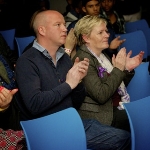On Air Now
The Capital Late Show with Sonny Jay 10pm - 1am
31 October 2013, 17:29 | Updated: 30 March 2016, 13:50
Young people from across Birmingham came together to unite against knife crime last night (30 October) as part of a pioneering drama project part-funded by West Midlands Police.
Capital went along to the performance, at the Lighthouse Young People's Centre in Newtown, which was attended by more than 150 people, including the parents of  Christina Edkins, who was stabbed to death on a bus whilst on her way to school in January.
Christina Edkins, who was stabbed to death on a bus whilst on her way to school in January.
Around 30 youngsters, aged between 13 and 18, were involved in the production as part of West Midlands Police's ongoing Knives End Lives campaign. They performed their own songs and poetry about how knife crime has affected them, following several weeks of rehearsals alongside music producers and drama professionals.
One of those taking part was 17-year-old Amara Darien who was stabbed as she tried to defend a friend who was being bullied. She said: "I didn’t realise at first until everyone told me there was a big hole in my face, then I started to get dizzy and drowsy. Everyone was shocked and my mum was very upset, but there were people who were able to help me.
"I'm involved in this project because I know how much knife crime can affect a person; it has changed my life a lot and the way I look at things."
Superintendent Richard Baker, who has spent many years as a senior detective investigating serious violent crime, attended one of the rehearsals ahead of the performance. He said: "I’ve dealt with too many murders where young people have lost their lives because they’re carrying knives - the impact is devastating for their loved ones.
"I have images of families that have broken down and struggled to come to terms with their loss that will haunt me for a long time.
"These projects are incredibly important for a lot of young people who often feel pressure from their peer group to carry knives for their own protection or because they think it’s a good thing to do to be accepted.
"It’s tremendous that these talented youngsters have come here voluntarily, off their own backs. The more we can work with young people to get these messages across, the more we will see knife crime reduce."
Music producer Dennis Jarrett is one of the volunteers who worked with the youngsters as part of the project. He grew up in Birmingham and turned his back on knives as a teenager after he was caught carrying one by police. He said: "If I was in the wrong situation and I had used that knife, I might be sitting here today in a different capacity. I would never carry a knife again after that.
"Today has been really sweet for me, talking to young people and getting them to think about knives. If you feel great when you’ve got that knife, trust me, it’s the wrong feeling, look at yourself in the mirror and ask yourself ‘where am I going to be in 10 or 15 years time?’ I’m telling you, it’s not worth it."
The Knives End Lives campaign focuses on the serious ramifications of carrying a knife and highlights that under joint enterprise rules, prosecutors have the power to bring before the courts people who were present when a crime was committed so that all face the same serious charges.
In 2012-13 there were 1,615 knife related incidents* in Birmingham, down more than 60 per cent since 2006-07, and across the wider West Midlands knife crime in the last six years has fallen by 63 per cent.
People can report people they suspect of carrying a weapon to police on 101. In an emergency, they should dial 999. Alternatively, those who do not want to speak with police officers directly can contact the independent charity Crimestoppers anonymously on 0800 555 111.
*There is no Home Office definition of ’knife crime’ however ’knife-enabled crime’ includes a variety of offences involving a bladed weapon or sharp instrument, this includes a bottle or glass (broken or unbroken).